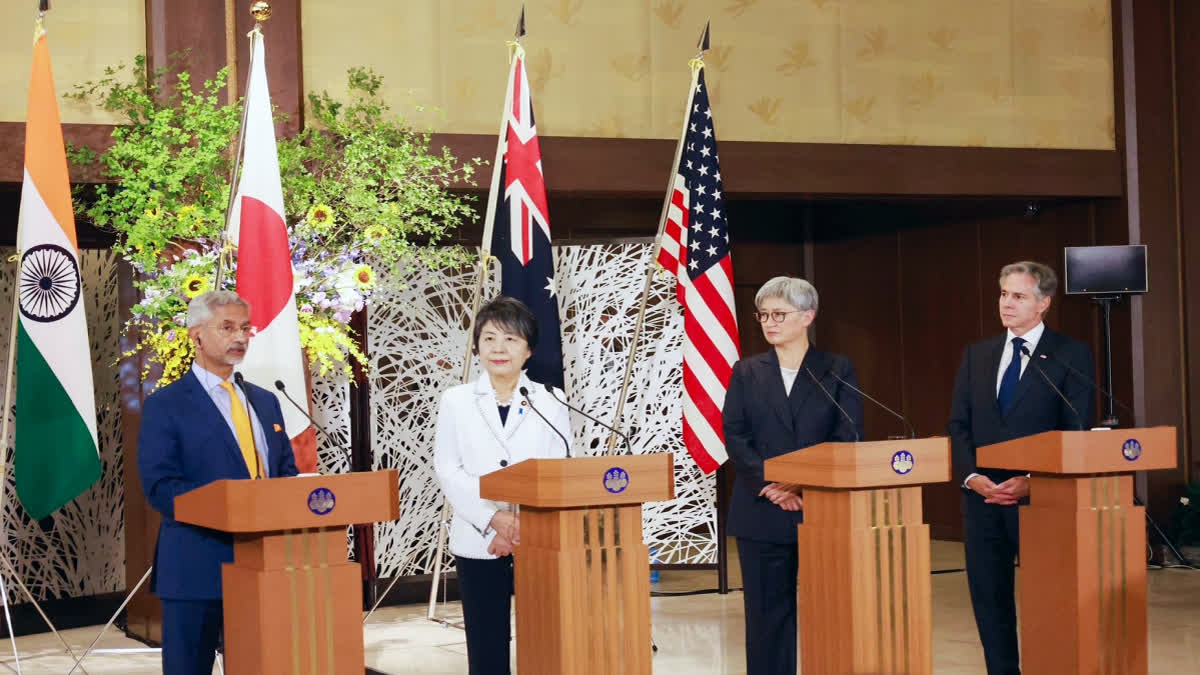New Delhi: Among the points made in the joint statement issued following the Quad Foreign Ministers’ meeting in Tokyo on Monday is the early operationalisation of the South Asia programme through the Information Fusion Centre-Indian Ocean Region (IFC-IOR) in Gurugram, India.
According to the statement released following the meeting attended by External Affairs Minister S Jaishankar, Japanese Foreign Minister Yoko Kamikawa, Australian Foreign Minister Penny Wong and US Secretary of State Anthony Blinken, the four countries expressed their determination to contribute to maintaining and developing the free and open maritime order consistent with the UN Convention for the Law of the Sea (UNCLOS) in the Indian and the Pacific Oceans, and for this purpose, to enhance their collaboration and coordination with regional partners.
“We continue to work with the Pacific Islands Forum Fisheries Agency to enhance regional maritime domain awareness in the Pacific through satellite data, training and capacity building,” the statement reads. “In line with such efforts, we intend to geographically expand the Indo-Pacific Partnership for Maritime Domain Awareness (IPMDA) to the Indian Ocean region. We are working for early operationalisation of the South Asia programme through the Information Fusion Centre-Indian Ocean Region (IFC-IOR) in Gurugram, India.”
The statement further elaborated that the Quad countries will be incorporating effective technical cooperation in close consultation with regional partners.
“We also contribute to the region through capacity building cooperation for enhancing maritime security,” it read. “We intend to launch a Quad Maritime Legal Dialogue under the Quad Maritime Security Working Group to focus our expertise on international law of the sea issues in support of our efforts to uphold the rules-based maritime order in the Indo-Pacific.”
So, what is the Indo-Pacific Partnership for Maritime Domain Awareness?
Launched at the Quad Leaders’ Summit in Tokyo in 2022, the IPMDA is a technology and training initiative to enhance maritime domain awareness in the Indo-Pacific region and to bring increased transparency to its critical waterways. The IPMDA harnesses innovative technology, such as commercial satellite radio frequency data collection, to provide partners across Southeast Asia, the Indian Ocean region and the Pacific with near real-time information on activities occurring in their maritime zones.
The IPMDA aims to monitor “dark shipping” and create a more comprehensive and precise real-time maritime overview of partner nations’ waters. It focuses on integrating the Pacific Islands, Southeast Asia and the Indian Ocean region (IOR) in the Indo-Pacific.
Dark shipping is a term used to describe a vessel operating with its Automatic Identification System (AIS) turned off. AIS transponder systems transmit a ship’s position at sea, alongside identification data and other useful information that vessels and maritime authorities can reference. In recent times, there have been several reports of Chinese naval ships or ostensibly research vessels in the Indian Ocean turning off their AIS.
“The cutting-edge maritime domain awareness picture provided under IPMDA supports the ability of Indo-Pacific partners to rapidly detect and respond to a wide range of challenges involving illicit maritime activities such as illegal, unreported and unregulated fishing, climate events, and humanitarian crises,” a posting on the Australian Prime Minister’s website states. “The initiative also involves regional information centres, helping to establish a common operating picture of the maritime domain across the Indo-Pacific region.”
Why is the Information Fusion Centre-Indian Ocean Region important within the IPMDA framework?
The Gurugram, India-based IFC-IOR is a regional maritime security centre hosted by the Indian Navy. Launched in December 2018, the centre works towards enhancing maritime security and safety in the Indian Ocean. Currently, the IFC-IOR has international liaison officers (ILOs) from 12 partner nations. It also has more than 65 international working-level linkages with nations and multi-national/maritime security centres.
The IFC-IOR was envisaged to be a nodal centre of excellence for promoting collaborative maritime safety and security towards a peaceful, stable and prosperous Indian Ocean Region. The mission of the centre is: “To advance maritime safety and security in the Indian Ocean Region by enhancing maritime domain awareness and coordinating activities, through information sharing, cooperation and expertise development along with partner nations and agencies.”
The Centre fuses, analyses and disseminates information on white shipping in the Indian Ocean. It also aims to collaborate with national and regional agencies and like-minded centres to generate comprehensive maritime domain awareness.
What is the South Asia programme of the IPMDA?
The South Asia programme of the IPMDS is part of a broader initiative aimed at enhancing maritime security and domain awareness among South Asian nations in the Indo-Pacific region. The programme supports the development of capabilities within South Asian countries to effectively manage their maritime domains. This includes providing training, technical assistance and equipment to enhance surveillance and enforcement capacities.
The initiative encourages collaboration among South Asian countries and with other Indo-Pacific nations. This includes sharing information, conducting joint exercises, and coordinating responses to maritime threats.
Overall, the South Asia programme of the IPMDA is intended to ensure a free, open and secure maritime environment in the Indo-Pacific region by strengthening the maritime capabilities of South Asian nations and fostering greater regional cooperation.
Read more: India Has An Issue With China And It Is For Two Of Us To Find A Way Out: EAM Jaishankar In Tokyo



